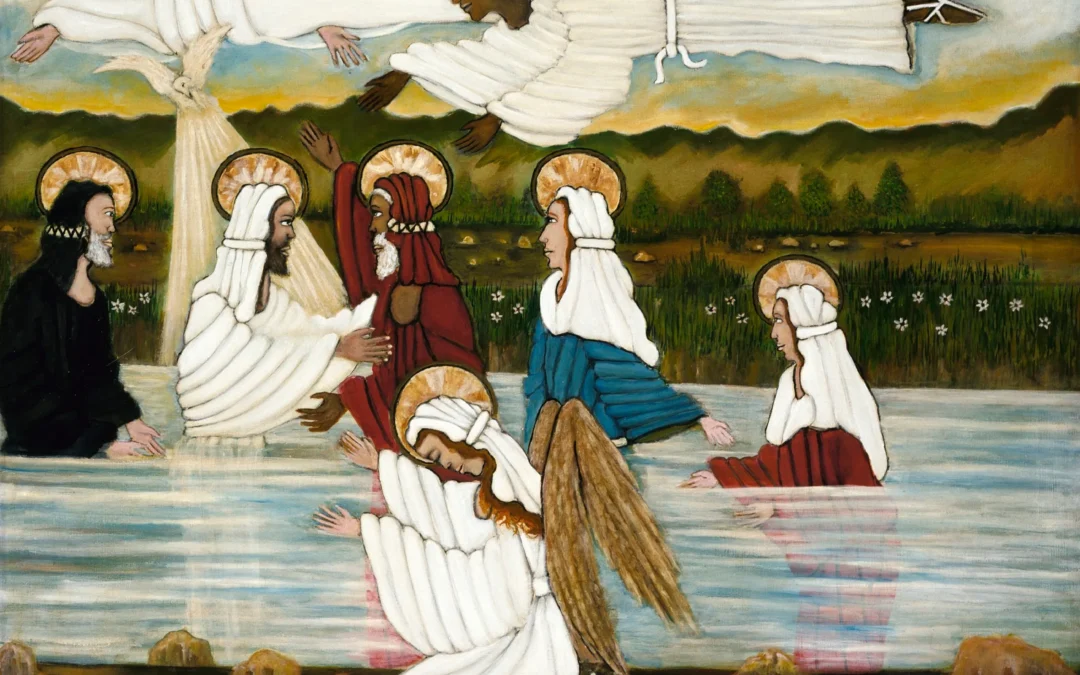Reflections on the Baptism of the Lord
Genesis 1:1-5; Psalm 29; Acts 19:1-7; Mark 1:4-11
Lorenzo Scott, Baptism of Jesus, 1987 (USA)
Today’s feast is about mission – yours, mine, and the garbage collector’s. All the baptized are
“missioned,” not just professional ministers. Life and the living of it is our baptism; dead to the
old self we rise to pain, to joy, to demands of greater faith and further hope.
Baptism is a process that continues over many years, symbolized and effected by the
sacramental sign received perhaps many years ago. It is a priestly commitment. To be baptized
is to share in the priesthood of Christ, having a part in the reconciling of all nature all humanity
to God. The Christian is a mediatorial person, one who offers body, blood, and spirit on the
cross called life. God accepts the offering and a slow transformation is begun which we cannot
comprehend. Humanity, done to death, is in a corpse-like condition. We raise it up from the
dead.
Because of our baptism we are the servant referred to in the gospel reading. We are the
covenant. In us the promise is made or broken. Others experience in us their own covenant
with God or they do not. We are called to be light, to open the eyes of the blind and bring
prisoners out of darkness.
I am not talking here about good example. If you live a reasonably decent Christian life you are
bound to give a good example. I am talking about the effects of baptism. St. Mark describes
what came with Jesus as not resembling a tame bath in water but mighty wind and fire. Think
of the forest fires blazing this past summer, whipping up their own fierce winds which drove the
conflagration ever further. But that is destructive wind and fire, you say. What kind of image is
that for what happens in the baptism of an infant child who has not even been consulted about
wishing to be a Christian. Listen to some imagery that came to light with the discovery of Jewish
papyrus scrolls along the shores of the Dead Sea in the late 1940’s. They come from the age
that immediately preceded that of Jesus. John the Baptist, who inhabited the same desert of
Judea, may have been nourished by this teaching.
[In the final age God will] purge by his truth all human deeds, refining [by fire] for
himself some of humanity in order to remove every evil spirit from the midst of their
flesh, to cleanse them with a holy Spirit from all wicked practices and sprinkle them with
the spirt of truth like purifiying water. (Community Rule, 1QS 4:20).
That is the imagery of cauterizing a wound, purging out dross in a smelting oven, cleansing
soiled flesh with cooling water. It is what the gospels say was accomplished in Jesus as he came
on the public scene to be prepared for his mission God anointed him with the Holy Spirit and
power (Acts 10:38).
Why do we not proclaim the gospel? Why do we not feel the compulsion to go out on mission?
It is a matter of conditioning largely. Ours is in large measure a clerical church. We remain
passive while assuming that those who are ordained will carry out the responsibilities of the
Christian community.
Anglicans tend to have a tradition of silent living of the gospel. We all know people at work or in
the neighbourhood who will talk endlessly about all that Jesus has done for them, or the joys of
being saved and how you can be as happy as he is. The trouble is, the evangelical tradition of an
endless flow of words has reduced those in the “mainline” churches to silence about salvation.
We literally have nothing to say. We cannot put into words how God saves the people of his
love through the cross in the power of the Spirit.
It is certainly a relatively recent innovation in Christian history to assume that everyone needs a
personal, rememberable experience of Jesus Christ in our lives and the power of his saving love.
This “experimental religion” as they called it in the British Isles dates back no earlier than the
seventeenth century. We may be delighted that there is no test of emotion or exhilaration to
validate our authentic belongingness as Christians. Still, there must come a time when we
accept for ourselves the promises made on our behalf when we were baptized as infants.
At a certain point in the ancient baptismal rite there is an exorcism. In it the whole Church prays
that the demons of hell may lose all power over this adult or child. “Ephpheta,” we say with
Jesus in his native tongue. “Be thou opened!” Perhaps Anglicans ought to be saying it today, we
the mute witnesses to Christ, we who, out of embarrassment, fear, incapacity, lack of
conviction, or whatever, do not preach the gospel.
Evangelism is being so full of Christ that you just cannot help sharing. God pity us if our
emptiness is the cause of our silence. But if you are so full of Christ that you cannot help sharing
then for God’s sake, speak!
Kevin+


Recent Comments